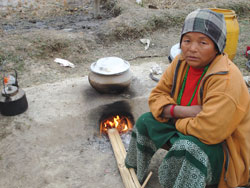|
|
Many Pahadis have already been displaced from the Madhes, and life has become increasingly difficult for many more who remain with the resurgence of hostility between Pahadi and Madhesi communities in the last year. In the plains, the line between empowerment and hostility has become blurred, exacerbating long-standing divisions between the two communities, and on top of this criminal elements have exploited genuine grievances to sharpen their own axe.
"We decided to leave after we couldn't take it anymore," says Sukul Bahadur Limbu with a sense of humiliation and bitterness. Limbu and his family, along with 150 other families of Pahadi origin, were forced out by Madhesi armed groups from Haripur VDC of Sunsari district. Now he is literally scavenging to stay alive. "They (locals) only let us work occasionally," he laments. With a family of nine, he is struggling to keep them warm and together. And he isn't alone.
For the last three months sixty families have been living in makeshift tents in Bange, one hour's drive from the Sunsari district headquarters Inaruwa. Man Maya Yakkha gave birth to a baby girl in her tent last month.
Most of these people fled at night-time with whatever they could carry. Some local organisations have been providing them with daily food rations. A local missionary school, Little Flowers, is helping the children with part-time schooling in the mornings. But nothing can make up for the loss experienced by both the children and the adults.
The events prior to their exile from their homes have deeply traumatised them. Men break down in tears as they recall the ordeal. Some were beaten and bruised, while their women and daughters were raped and sexually harassed in front of them, according to one.
Some of the displaced have gone as far away as Jhapa, Morang and Sankhuwasabha in search of some relief. But even those who had wandered far off are now coming to live together in Bange. The women refuse to go back to Haripur, though the men say they might consider going back if the government provides adequate security. So far, however, no help has been forthcoming either from the government or from non-governmental agencies specialised in helping the displaced.
There is pain and anger amongst the people at Bange. Pain that such cruelty and excesses would be committed against them in their own country; and anger that the government continues to overlook their grievances. "We're not Indian or Bhutani refugees," says Kamal Tamang, "so why are we being treated like foreigners?" He also says that many of his Madhesi former neighbours were hand-in-glove with the criminals in harassing them.
The mixing of criminal elements with politics in the Tarai is stirring up communal venom and tarnishing the genuine demands of the people of the Madhes. Those displaced say that Madhesi Tigers and other armed groups harassed them continually up until they left - often in a very degrading manner.
"We weren't affiliated with any political groups," says Bal Bahadur Rai, "so why were we targeted?" Events like this are only likely to harden attitudes on both sides.



